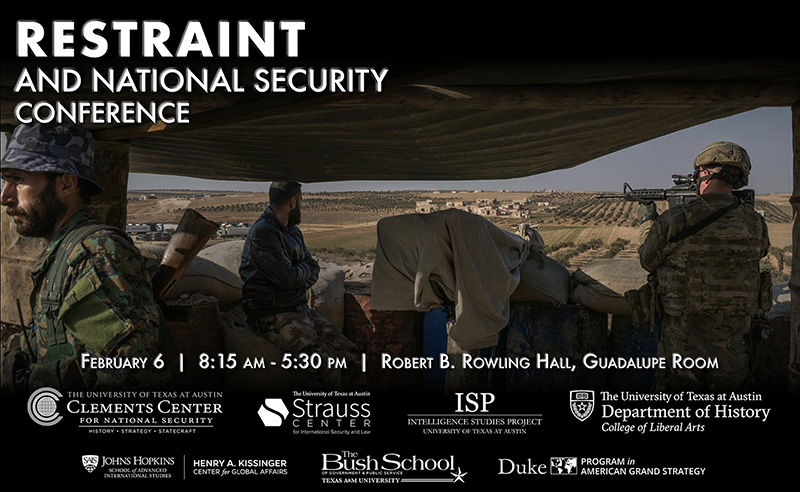
On Feb. 6, the Clements Center for National Security, the Strauss Center for International Security and Law, the Intelligence Studies Project, and the Department of History at the University of Texas at Austin in partnership with the Kissinger Center for Global Affairs at Johns Hopkins; the Duke University Program in American Grand Strategy; and the Texas A&M Albritton Center for Grand Strategy, will host a conference on "Restraint and National Security." The conference will explore the intent, the causes, and the consequences of restraint in foreign engagement in the course of American history.
Advance registration is required, but does not guarantee a seat.
Supported by both political parties, worldwide engagement has characterized American foreign policy for many decades. Debate has most often revolved around the nature and details of engagement strategies. But the presidency of Donald Trump has provoked contentious debate concerning American engagement with the world. Indeed, the Trump presidency has shifted that debate towards a more fundamental question: Is worldwide engagement a useful or valid expression of American political life? Moreover, recent works like Stephen Walt’s The Hell of Good Intentions and a recent Minerva Initiative study, The Political, Economic, and Social Effects of the United States' Overseas Military Presence, are examples of fresh academic interest in examining and questioning the history and consequences of America’s broad foreign engagement.
In view of this, the Clements Center and its partners will convene a conference in order to examine moments in the history of American foreign relations when policy makers and/or the American public have embraced or emphasized restraint in foreign engagement. We hope to discover causes, connections, implications, and lessons that may inform our current moment, as leaders challenge the usefulness of a variety of engagement practices such as alliances, treaties, security assistance, détente, and direct military intervention.
Conference date and location:
Thursday, Feb. 6 at Robert B. Rowling Hall (RRH), Guadalupe Room
Agenda:
8:15 – 8:45 am • Arrival, Breakfast, and Coffee
Coffee / Tea / Light breakfast available
8:45 – 9:00 am • Welcome Remarks
Paul Edgar, Associate Director, Clements Center for National Security
9:00 – 9:30 am • Sources of Restraint and Engagement in Civil Society
William Quinn, Johns Hopkins, SAIS
9:30 – 11:00 am • Panel One: Paradoxes of Restraint
• Jeongseok Lee, Albritton Center for Grand Strategy, Texas A&M University
• deRaismes Combes, Clements Center for National Security, University of Texas at Austin
• David Tier, Duke University
• Tyler Bowen, Yale University
• Moderator: Rebecca Johnston, University of Texas at Austin
11:00 am – 12:15 pm • Panel Two: History and Restraint
• Leyla Tiglay, The Ohio State University
• Diana Bolsinger, LBJ School of Public Affairs, University of Texas at Austin
• Emily Whalen, Ernest May Fellow, Harvard Kennedy Belfer Center for Science and International Affairs
• Moderator: Paula O’Donnell, University of Texas at Austin
12:15 – 12:45 pm • Lunch
Buffet lunch provided for participants and registered guests
12:45 – 1:45 pm • Keynote #1: A Historian Reflects upon Restraint
Frank Gavin, Giovanni Agnelli Distinguished Professor and Director, Henry Kissinger Center for Global Affairs,
Johns Hopkins University School of Advanced International Studies
1:45 – 2:45 pm • Keynote #2: Offshore Balancing: Revisiting the World War II Case
John Schuessler, Co-Academic Director, Albritton Center for Grand Strategy, Bush School of Government and
Public Service, Texas A&M University
2:45 – 3:00 pm • Coffee break
3:00 – 4:15 pm • Panel Three: Restraint Under the Influence – Leaders and Structures
• Theo Milonopoulos, Columbia University
• A. Bradley Potter, Johns Hopkins, SAIS
• Tim McDade, Duke University
• Moderator: Ashlyn Hand, LBJ School of Public Affairs, University of Texas at Austin
4:15 – 4:45 pm • “Avoiding foreign entanglements” – Reflections in View of American Political Origins
Charles Zug, University of Texas at Austin
4:45 – 5:15 pm • Reflections in View of the Practice of Strategy
Brigadier General (Ret.) Kimberley Field, Executive Director, Albritton Center for Grand Strategy, Bush School
of Government and Public Service, Texas A&M University
5:15 pm • Conference Adjourns
This event is free and open to all students and the public. Seating for the panel discussion is limited.
Parking is available for a fee in Rowling Hall Garage (entrance is off of 20th Street).
For more information, contact Elizabeth Doughtie at elizabeth.doughtie@utexas.edu.

